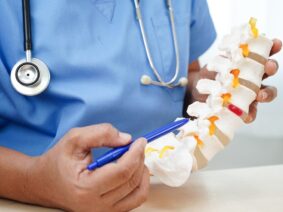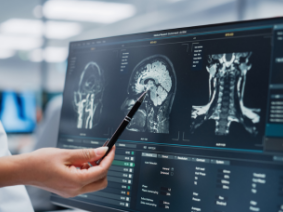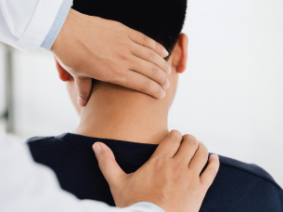What is a herniated disc?
The discs between the vertebrae in the spine act as cushions, shock-absorbers and are what give the spine its flexibility. A herniated disc—also known as a slipped disc—is a condition that arises when the soft, coushoning center of a disc leaks through a crack in the tough outer exterior and places pressure on nearby nerves or nerve roots, resulting in symptoms. This typically occurs in the cervical (neck) and lumbar (low back) sections of the spine.
What causes a herniated disc?
In most cases, a herniated disc is due to the normal wear and tear that the spine goes through as patients age and the discs lose fluid, a process known as disc degeneration or degenerative disc disease (DDD). However, other factors can result in a herniated disc including:
- A genetic tendency to developing a herniated disc
- Excess body weight that places stress on the lumbar spine
- Injury to the lumbar or cervical spine, such as a motor vehicle accident or sports injury
- Occupations that require a lot of repetitive physical activity, especially bending, pulling, twisting or heavy lifting
- Smoking that constricts blood vessels and reduces oxygen and nutrient-rich blood flow to the discs
What are the symptoms of a herniated disc?
With cervical disc herniation:
- Arm and neck pain that can spread from the neck and upper back and radiate down the arm
- Muscle weakness that can result in stumbling or problems with lifting and holding items
- Tingling or numbness in the arms
With lumbar disc herniation:
- Low back pain that can radiate to the buttocks, calf or foot
- Numbness or tingling in the legs
How are herniated discs diagnosed?
Following a thorough medical history, a physician will perform an exam to determine where the pain is coming from. In addition, a neurological exam will be done to assess:
- Compression of the nerves
- Muscle strength
- The ability to feel certain sensations, such as pinpricks or vibrations
- The reflexes
- Walking abilities
Diagnostic testing may also be performed to confirm a diagnosis or if the physician suspects another condition is causing symptoms. These can include:
- A magnetic resonance imaging (MRI) scan to find the location(s) of the herniated disc and disturbed nerves
- An X-ray to exclude other causes of symptoms, such as a tumor or infection
- Electrodiagnostic testing to evaluate the severity of a nerve injury or to determine what specific nerve is hurt
How are herniated discs treated?
With most patients, conservative methods of treatment are successful in alleviating symptoms. They include:
- Over-the-counter (OTC) medications (if the pain is mild to moderate)
- Nerve-stabilizing medications to help treat radiating pain in the arms or legs
- Cortisone (steroid) injections directly into the area where the affected nerves are
- Physical therapy exercises to minimize pain, increase strength and mobility and to teach patients how to protect the back and neck from further injury
- Narcotics to ease pain if OTC medications do not work
- Complementary therapies, such as acupuncture (alternative options)
Should all other treatments fail to relieve symptoms—which is rare—surgery may become an option. This includes procedures that remove a portion of the damaged disc, remove the whole disc then fuse the vertebrae together, and relieve nerve pressure.
How can a herniated disc be prevented?
In order to prevent disc herniation from occurring or reoccurring, patients can take measures including:
- Exercising to strengthen muscles and keep the spine flexible and stable
- Maintaining a healthy weight
- Quitting tobacco cigarettes
- Retaining good posture by keeping the back straight when sitting and lifting with the legs
For more information about herniated discs or to schedule an appointment with a specialist, contact us today.



